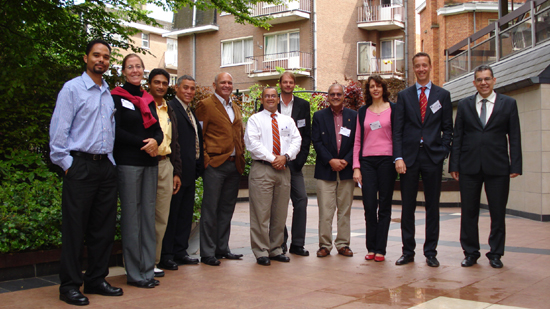 Philipsburg/ St. Eustatius. A delegation from the Netherlands Antilles and from Aruba visited Brussels this week in order to attend a two day workshop organized by the Overseas Countries and Territories Association (OCTA) of the EU on April 27th and 28th. Following an intensive review of Environmental Impact Assessment systems in all of the EU overseas territories in the past six months, the delegation of seven from the Netherlands Antilles and two from Aruba were invited to the workshop, which focused on Environmental Impact Assessments (EIAs) and Strategic Environmental Assessments (SEAs). Both government departments and environmental NGOs were represented from the Netherlands Antilles, namely Miriam Jonker (DROV, Curaçao), Faisal Dilrosun (LVV, Curaçao), Tico Ras (Environmental Service, Curaçao), Rueben Thompson (St Maarten PRIDE Foundation, EPIC), Nicole Esteban (STENAPA, Statia), Marco Gravenhorst (DROB, Bonaire) and Frank van Slobbe (DROB, Bonaire). Representing Aruba were Byron Boekhoudt (Coastal Zone Management Unit) and Henry de Cuba (Ministry of Health and Environment). Head of general and judicial affairs of the Cabinet of the Plenipotentiary Minister of the Netherlands Antilles, Laurens Warnink and European Union representative for Aruba, Raymond Croes also attended the workshop.
Philipsburg/ St. Eustatius. A delegation from the Netherlands Antilles and from Aruba visited Brussels this week in order to attend a two day workshop organized by the Overseas Countries and Territories Association (OCTA) of the EU on April 27th and 28th. Following an intensive review of Environmental Impact Assessment systems in all of the EU overseas territories in the past six months, the delegation of seven from the Netherlands Antilles and two from Aruba were invited to the workshop, which focused on Environmental Impact Assessments (EIAs) and Strategic Environmental Assessments (SEAs). Both government departments and environmental NGOs were represented from the Netherlands Antilles, namely Miriam Jonker (DROV, Curaçao), Faisal Dilrosun (LVV, Curaçao), Tico Ras (Environmental Service, Curaçao), Rueben Thompson (St Maarten PRIDE Foundation, EPIC), Nicole Esteban (STENAPA, Statia), Marco Gravenhorst (DROB, Bonaire) and Frank van Slobbe (DROB, Bonaire). Representing Aruba were Byron Boekhoudt (Coastal Zone Management Unit) and Henry de Cuba (Ministry of Health and Environment). Head of general and judicial affairs of the Cabinet of the Plenipotentiary Minister of the Netherlands Antilles, Laurens Warnink and European Union representative for Aruba, Raymond Croes also attended the workshop.EIAs are studies regarding potential environmental (and social) impacts of a proposed project or action. SEAs are the assessment of potential environmental (or sustainable development) impacts of proposed plans, programmes and policies. The cost of EIAs are generally covered by the project developer and should be carried out by independent consultants selected by government/environmental authorities prior to the development of any plans in order to incorporate alternative development options and recommendations of the EIA, including mitigation efforts, into the overall planning process. EIAs should always be conducted for large scale projects such as condominiums, hotels or resorts, waste management facilities, oil refineries, energy production installations, or any large scale expansion of urban development and as otherwise determined by government/environmental authorities. SEAs should be conducted for long term programmes, such as a Zoning Plan, Tourism Master Plan or Multi Annual Economic Policy Plan.
During the intensive two day meeting, over 50 delegates from 16 overseas territories learned about the EIA/SEA implementation process and incorporation into the national planning processes. Speakers from various overseas territories (including Bonaire, Cayman Islands, New Caledonia and Greenland) described existing or proposed legislation and systems for EIAs, as well as presenting case studies from their own countries. The case study presented from the Netherlands Antilles by Marco Gravenhorst focused on incorporation of SEA into the land use planning process currently underway on Bonaire.
Delegates learned that EIAs and SEAs can only be effective when clearly described within island legislation, and well integrated within government departments, such as Planning, Public Works and Domain including laws and policy documents such as zoning, infrastructural plans and building ordinances. Worldwide, SEAs are frequently adopted as a planning tool by authorities in preparing zoning plans and other kinds of policies or programs. The delegations take home guidelines for EIAs and SEAs that are relevant for small islands. Overall recommendations from the workshop included urgent establishment of legislation, including systems for execution of EIAs and SEAs, on each island.











